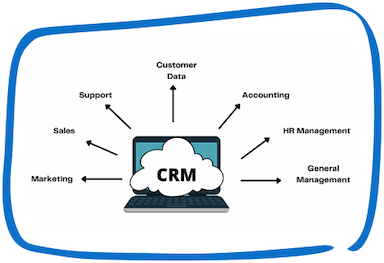Sales operations professionals measured financial data, producing reports, and forecasted sales in the early days of the industry. They were primarily number crunchers and problem solvers. They carry out all of that and much more in the recent era. CRM software help in the automation of tedious work.
What are sales operations?
The actions and tasks performed by frontline sales teams in sales companies are referred to as sales operations. Sales operations teams typically take care of the administrative and technical chores that would otherwise be the responsibility of salespeople.
A sales operations team also optimizes operations to increase sales efficiency and give sales representatives more time to interact with customers. Nowadays, CRM systems can manage all the intermediate sales operations responsibilities.
The basic importance of sales operations
Generally, a sales operations team’s responsibility includes managing technical tasks and creating sales tactics. A sales ops team frees up sales professionals to focus on activities that generate revenue. While they free up sales managers to focus on coaching and deliberate decision-making to better assist their teams.
While the sales ops team produces data-driven insights, develops strategy plans, and ensures that the relevant processes are in place. The sales ops team uses CRM solution all over to manage their heavy tasks.
Difference between sales and sales operations
Although “sales operations” may sound like an overly broad term, it covers a lot of ground. Sales ops are the hand that steers the ship, but it’s more than just what a sales team does every day.
A sales department may have several teams with different roles but they are all intended to complement one another. Assisting salespeople with tactical knowledge derived through data analysis is the responsibility of sales operations.
The front-line sales staff is responsible for person-to-person sales, but the sales ops team manages sales from a more strategic perspective.
Typically, a logistical support branch and a strategic design branch are separated within sales ops teams. One side can be more technical, handling things like setting up your sales CRM software, while the other might be more intangible, improving each stage of the sales pipeline.
Different roles and responsibilities in sales operations
Roles in sales operations
- sales representative for operations
- Manager of sales operations
- Manager of sales operations
- Senior Director or Vice President of Sales
Key responsibilities in sales operation
Data Management for Sales
To assess the success of a product, a sales strategy, or a marketing campaign, sales operations analyses and assesses sales data. By doing this, sales operations can determine whether a product or service is a success. if the data indicates otherwise, decide to develop a new sales plan or method. CRM for small businesses can manage all the data in their systems.
Forecasting sales
Sales operations can forecast future sales and report on future needs and objectives by analyzing and comprehending historical data and performance trends. This is crucial because sales predictions enable sales teams to identify future risks early enough to avoid or resolve them.
Generating leads
Sales operations handle Administrative responsibilities including lead generation and scheduling appointments with leads and contacts. They handle this through CRM software so that salespeople can concentrate on closing deals.
Support for Sales Representatives
The goal of sales operations is to increase the effectiveness and efficiency of salespeople. They accomplish this by supplying leads, handling transactions, creating contracts, and offering time management training. CRM applications for small businesses have all these features.
Customer Service Communications
By reporting on sales and campaign results and sharing team updates and sales victories, sales operations are in charge of keeping the sales team on the same page. This responsibility definitely gets worked in the CRM system well.
Strategies
Strategies aim to maximize the effectiveness of sales rep performance. In addition, lead management, putting industry standards into practice, and choosing target sales KPIs are a few examples of duties in this context.
Tips for sales operation success
Develop a mission statement.
Starting with identifying their goals and missions, the sales ops team should make sure that they are in line with those of the sales team. Everyone will be on the same page if the company as a whole understands that mission.
Instead of making general comments, focus on being specific and outlining the “how” of reaching each goal.
Encourage collaboration
Check-in regularly with sales enablement, marketing, and sales to make sure you’re addressing the appropriate problems, dealing with the crucial ones, and not doing anything repeatedly. You need to schedule regular meetings as well.
An effective demonstration of this procedure in action would be a weekly meeting of the leaders of each team to discuss everything that has been accomplished. Sales is a fast-paced industry, so many little adjustments can be made in a week. Communicating effectively keeps the entire business on the same page.
Create a defined leadership structure
The head of the sales ops team ought to be someone in a position of authority, like a director or vice president. That individual should in turn answers to the company’s executive team, such as the COO or CEO. This creates a clear chain of command and leadership structure.
To create a system with efficient workflow, there must be a well-structured hierarchy.
Examine the sales team.
Make it a requirement for members of your sales ops team to observe salespeople once every three months. This offers them the ability to see firsthand the typical sales difficulties and the effects their work might have. Additionally, it enables a stronger bond to develop between the two departments.
Choose your tools carefully.
Consider deeply and strategically when deciding where to use technology. For instance, automation features can benefit the sales staff by removing the majority or all of the repetitive manual chores that consume a significant amount of their time.
When selecting technology for your company, a good rule of thumb is to consider if it supports or hinders operations. Does it meet a requirement or resolve a problem? In that case, ask yourself if implementing new software is worth the time and money it will take to buy it and educate your team to use it.
Manage your sales operations like an expert with Elatesoft
Elatesoft: Best Sales CRM Software in the UAE: CRM Dubai for small businesses
Your sales operation staff may exceed expectations by eliminating redundant tasks, monitoring performance, and fostering communication. Furthermore, with Elatesoft CRM software, they can all be completed quickly.
With the use of the Elatesoft CRM application, you can maintain stronger relationships with your clients. helps you carefully manage each lead by conducting regular follow-ups and providing proposals that are automatically prepared and appropriate for each of your clients. Analyze each sales executive’s performance by keeping track of all the businesses they have won and lost. Finally, get reports on previous transactions in the form of interactive charts, graphs, and statistics.
Conclusion
After all, sales operations departments have been increasing the effectiveness and impact of sales teams globally for almost five decades. What was formerly thought of as a support network is now an important component of the sales puzzle.
Speak with Our Team!
4.9 Stars
1k+ reviews on






